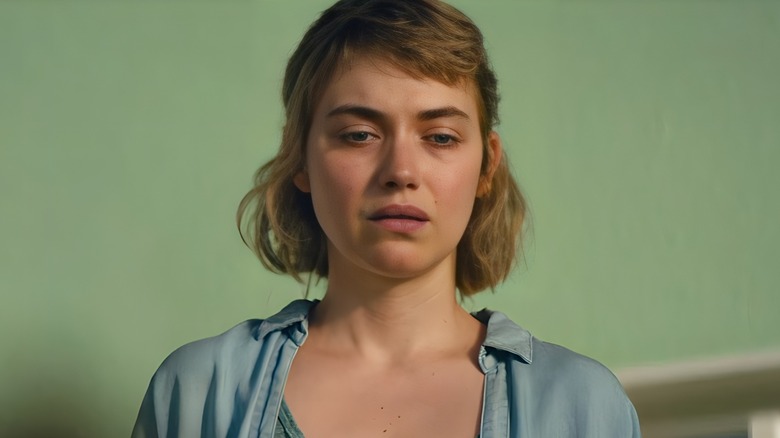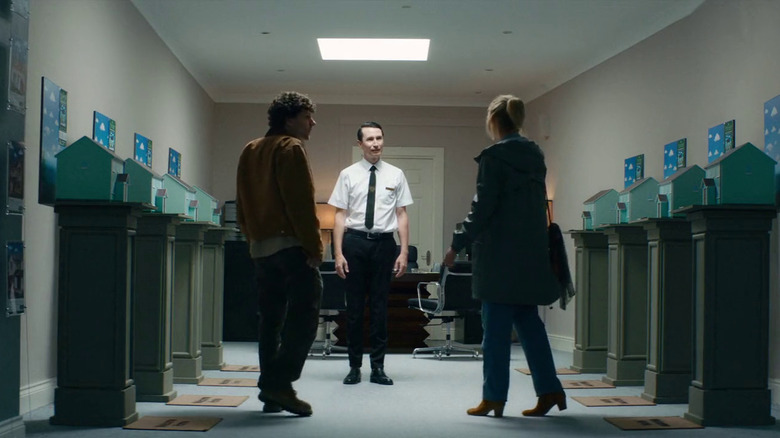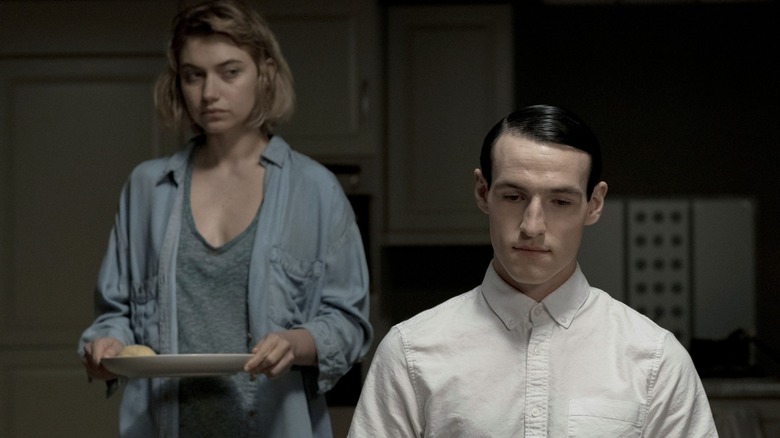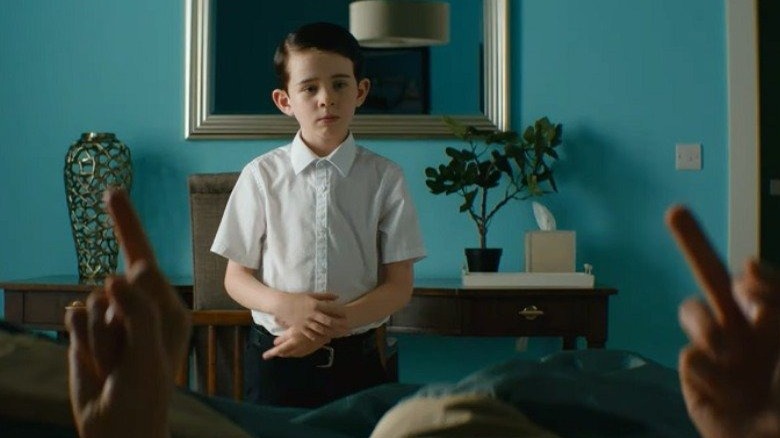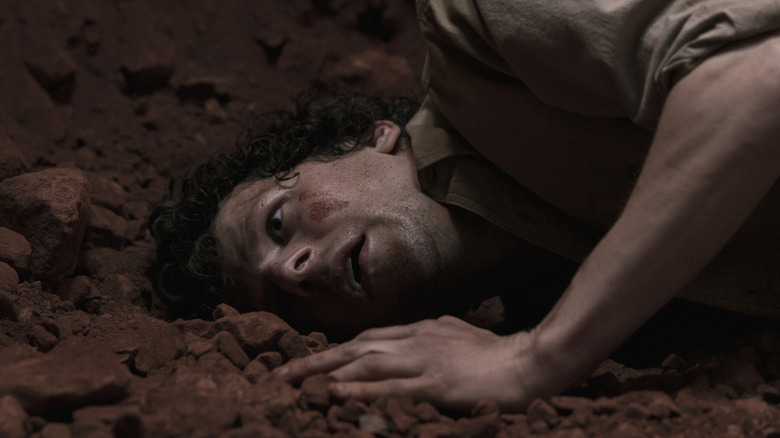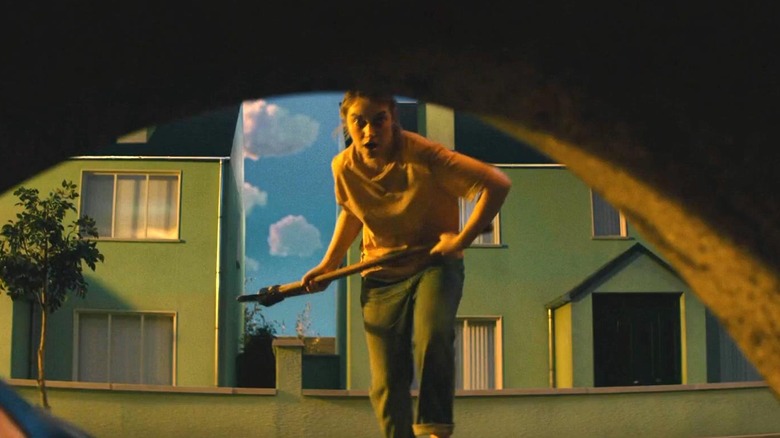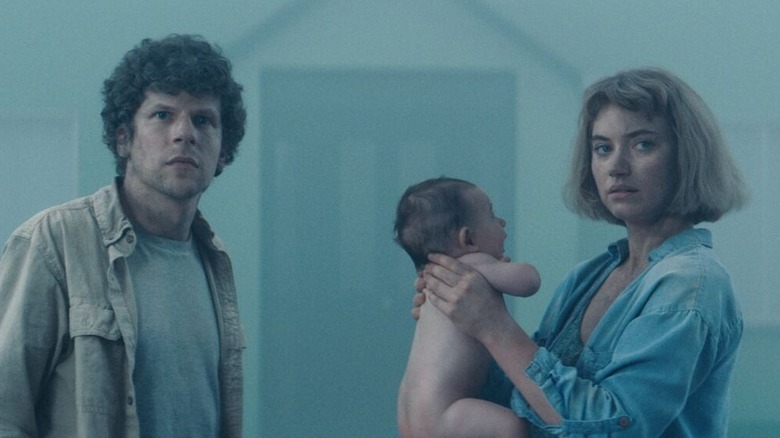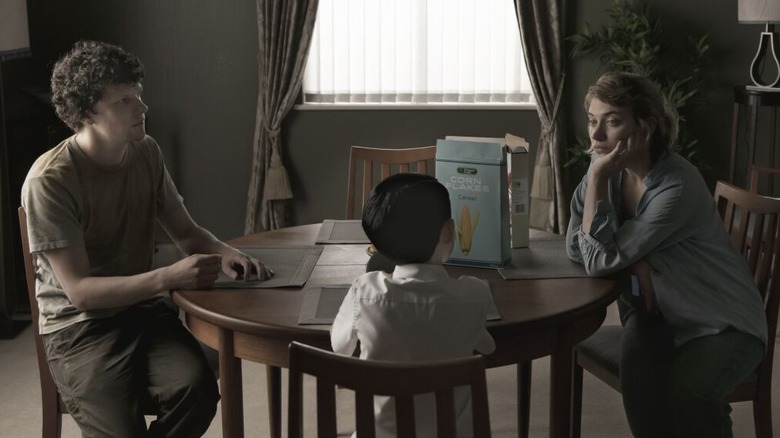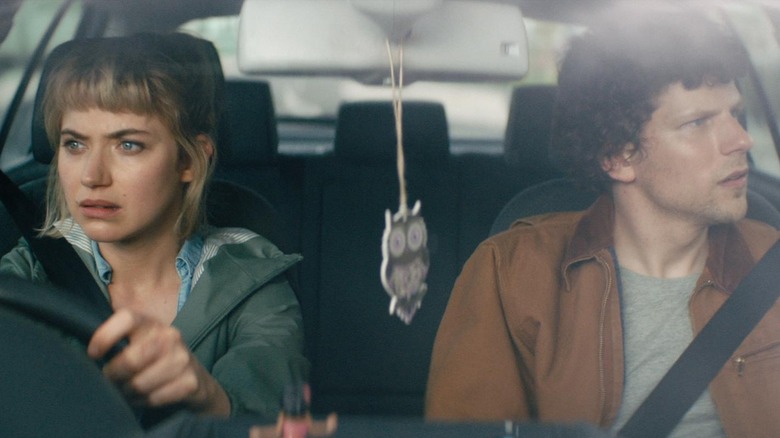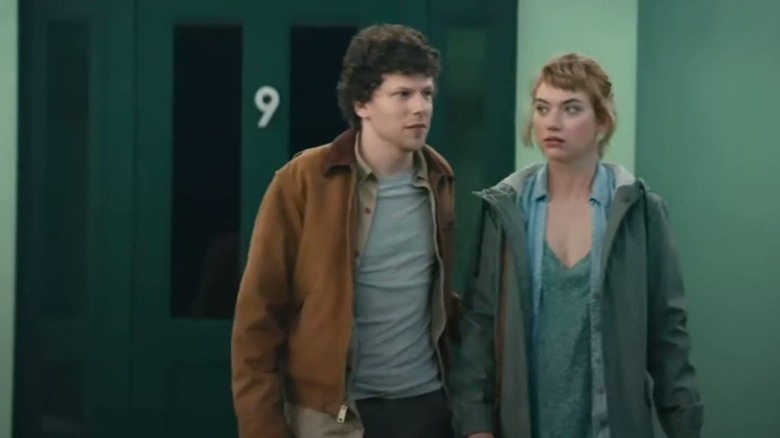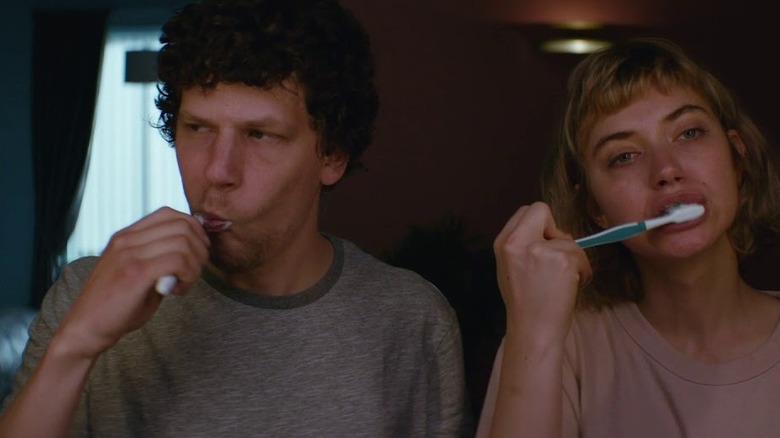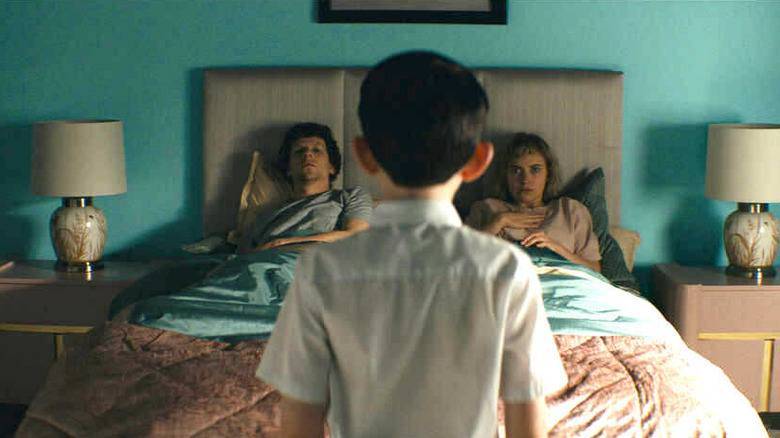The Ending Of Vivarium Explained
There are films that offer up straightforward stories of action, drama, thrills, and chills, and then there are movies that are deliberately mystifying — like 2020's "Vivarium." Co-written and directed by Irish filmmaker Lorcan Finnegan, "Vivarium" is unlike any other movie you've ever seen. With a stylish visual flare, the film operates more or less as a character study of Tom (Jesse Eisenberg) and Gemma (Imogen Poots), a young couple who are looking to buy their first home together.
When they go looking at new houses, though, Tom and Gemma get far more than they bargained for after an odd agent named Martin (Jonathan Aris) takes them to a remote community called Yonder. A mysterious little suburb where everything feels a little off, from the identical houses to the clouds that are a little too perfect. Soon, Gemma and Tom find their happy house hunting turning into a nightmare when they become stuck in Yonder, unable to leave, and forced to care for a child that has been dropped in their lap with no explanation.
An often confusing movie, "Vivarium" all but screams to be analyzed, and it wouldn't be surprising if you came away scratching your head and wondering what you just saw. If that's the case, pull up a chair and don't expect to be released until you've finished reading, because we're here to help you make sense of the ending of "Vivarium."
What you need to remember about the plot of Vivarium
Often described as a feature-length episode of "The Twilight Zone," Lorcan Finnegan's "Vivarium" opens on Tom and Gemma, a couple who are at odds about their future. Gemma wants to live in the country, while Tom dreams of an exciting city life. They decide to compromise and look at houses in the suburbs, landing in front of real estate agent Martin (Jonathan Aris). He takes them to Yonder, a small town outside the city comprised of endless rows of identical homes.
When they're looking at Home #9, Martin vanishes, leaving Gemma and Tom all alone and stuck in Yonder after they inexplicably cannot find an exit. Not long after, the couple discovers a baby delivered to their doorstep, with a promise that they will be "released" if they raise him as their own. But the baby quickly becomes a young boy who behaves nothing like a normal child, mimicking them in their own voices and screeching like a banshee at the strangest times. They even find him watching bizarre images on the home's television in the middle of the night, and asking confounding questions about ordinary things.
Obsessed with finding a way out, Tom begins digging a hole in the front yard. Gemma meanwhile finds herself becoming protective of the child, who calls her mother, much to her chagrin. Little about this place makes any sense — to Gemma and Tom, or even the audience — but all they want is to go home.
What happened at the end of Vivarium?
Unable to cope with being trapped in Yonder, Gemma and Tom have been forced to raise a child that is driving them insane. But when the boy disappears one day and returns with a strange book filled with alien language and symbols, Gemma questions what is really going on. Hoping to get information from him, she plays a game with him that reveals inhuman venom sacks on his neck. Eventually, the boy becomes a man — stoic and steely-eyed — and Gemma now lives in fear.
Not long after, Tom's condition worsens, and he dies in Gemma's arms. Distraught, she watches in horror as the boy puts Tom's body in a vacuum-sealed bag and dumps it in the hole that Tom had been digging. This causes Gemma to finally snap, and she begins chasing the boy with a pickaxe, but in a shocking moment, the boy crawls on all fours and lifts the edge of the sidewalk like a rug, jumping into a surreal dreamscape beneath the suburban neighborhood.
Unfortunately, when Gemma is thrown back above ground, she is near death, and the boy puts her too in a vacuum-sealed bag, before she tells him with her dying breath that she is not his mother. In the closing moments of the film, the now-adult boy arrives at the real estate office and meets an elderly Martin. He takes Martin's nametag and puts his body in a vacuum-form bag, depositing it in a file cabinet before sitting down and welcoming another young couple looking for a home.
Who was the boy?
Known to audiences only as 'the boy,' he was handed to Tom and Gemma in a cardboard box the morning after they tried burning down House #9 in a desperate bid to get out of Yonder. Forced to keep him alive in the hopes that whoever their captors were would release them, Tom and Gemma are driven slowly insane by the child, whose behavior is downright alien. He doesn't seem to understand basic human behaviors, and grows seemingly overnight from baby to boy to man — which has led many to wonder who or what he really is.
While the film doesn't give us any concrete answers, the book he arrives home with one day — and his strange throat sacks — suggest he may be an alien visitor who lives an accelerated lifespan. They've come to Earth to use human couples as a means of learning humanity and to raise them to adulthood, after which they repeat the symbiotic cycle of life.
The truth is, though, like much of the film, the actual nature of the child isn't really important. "Vivarium" is a movie with a lot of hidden meaning and is more about its stinging social commentary than it is about its literal story. If you're looking for a movie with definitive answers and a neatly resolved narrative, "Vivarium" probably won't satisfy you.
Why did Tom get sick?
Upon discovering the dirt beneath the artificial grass on their front lawn, Tom begins digging a hole, much to Gemma's annoyance. He quickly becomes consumed with finding what's beneath, to the point where it occupies his every thought. It even prompts the first fight between Tom and Gemma, revealing a temper in him that we hadn't seen before.
But as his work on the hole progresses, requiring a long ladder and a bucket and pulley system, Tom begins to get sick. His illness gets worse the further he digs, until he finally dies. Some may wonder why Tom got sick at all, as there weren't any communicable diseases present in Yonder. This is one of the many allegories in the film, though, because the hole he digs and his illness are not to be taken as literally as they may seem.
Tom's obsession with digging the hole is a metaphor for work and career. Like many in our own modern world, Tom's task of digging takes over his life, to the point where he isn't present at dinner time, with Gemma having to make excuses for him to the boy, just as a mother would to her child when his father works late and is never home. Ultimately, Tom gets sick and dies from overwork, an all-too-common situation in modern capitalist societies, which force people to work their entire lives, from paycheck to paycheck, with little time to enjoy the fruits of their labor.
What was the world beneath the street?
At the climax of the film's trippy ending, Gemma has watched the boy bury Tom in the front yard and finally takes it upon herself to put an end to her living nightmare. Grabbing a pickaxe, she chases the boy, who reveals a hidden passage beneath the sidewalk. Following him, Gemma discovers an ethereal world of other homes beneath the surface that doesn't seem quite real. She finds herself confronting other children like the boy and other parents like herself, but everything has an abstract, other-worldly quality, and we're not sure what this place really is.
Like the boy himself, the world beneath the street is another element that is open to interpretation. On a literal level, it appears that Gemma is encountering other scenarios just like her own, where similar couples have been trapped and forced to raise an inhuman child. In a more figurative sense, it could be Gemma learning that this experience is simply something that other people go through as well.
So what does it all mean?
A less-than-literal story, "Vivarium" is full of metaphor and allegory that some may miss on first viewing. Many have caught it right away, though, particularly after the eye-opening ending that closes out the film on a decidedly bleak note. When the credits roll, Gemma and Tom are dead, and alien real estate agent "Martin" is introducing a new couple to the homes at Yonder — who we presume are going to go through the same hell that they did. Consequently, it's not difficult to see the film as a treatise on modern living, suburban mundanity, and the dreariness of everyday life.
When they first enter Yonder they don't really want to be there, yet find themselves stuck in the same way many young couples find themselves trapped in less-than-ideal circumstances. This might be because of financial or social constraints, or marital compromises, but the film shows us an exaggerated, sci-fi take on what it means to be forced into an unfulfilling, repetitive existence. Like many who toil at a job for years, have little free time for fun, and find themselves in a never-ending "rat race," Gemma and Tom are inserted into roles they don't want.
Forced to be the sole caretaker because of Tom's disdain for the boy, Gemma loses autonomy and self-determination. Tom, by contrast, is conditioned into a "job" with no end and no reward. And when the boy is grown, the "parents" have fulfilled their purpose and die.
Is there a more literal explanation?
Despite the film's very obvious metaphorical meaning, there are those who wonder if the narrative also has a more literal explanation. Could the film be about an alien invasion or a race of creatures who have come to Earth for some nefarious purpose? Fans online have mused that the unearthly nature of the boy, including his strange neck sacks and ability to mimic other voices, is both sinister and potentially threatening. The alien book seems to suggest that he is there to learn something, while the patterns he watches on TV could be communication from otherworldly superiors giving him instructions.
As a result, some have wondered if the boy's presence has a dark purpose. Could he be there to learn about humanity and feed his findings back to his people? Then, when the time is right and they have all the information they need, they'll be able to invade and conquer the planet. While this more literal interpretation of the story is only ever hinted at in the film, it's as important a narrative answer as the allegorical elements and provides audiences looking for a concrete resolution with a satisfying answer.
Is there another interpretation?
Stuck in a strange, surreal world, Tom and Gemma can't possibly be in a normal town, which is one reason why some may leap to the conclusion of some kind of alien habitat created just for them. But the weirdness of Yonder often goes beyond the fact that it's unusual, because there are elements that often feel downright impossible, including a burning house that rematerializes the next morning, or endless loops of space with no exit, not to mention the ethereal underground world.
With all of this in mind, there's yet another interpretation that arises: Tom and Gemma are stuck in purgatory, the land beyond life where souls are judged before being sent to heaven or hell. In this interpretation, the task of raising the boy is a test to determine their true nature, and the "release" sends them to heaven or hell. Sure, there's a bit less evidence to support this theory, but it's an idea that adds an extra layer of thought-provoking detail and forces us to ponder the story on an even deeper level, which the film is practically begging audiences to do.
What Imogen Poots says about the meaning of Vivarium?
"Vivarium" was one of the few films released to cinemas in March 2020, just as the COVID-19 pandemic was forcing millions into isolation. As a result, some of the story's deeper themes took on a new meaning, and star Imogen Poots was keenly aware of that fact. "I think [COVID-19] does change some elements," she told Playlist in April of that year. "You might say 'oh yeah, we were thinking about the housing crisis' or 'I was thinking about motherhood.' But then something like this happens and you do look at it in a new way."
Focusing on the message of societal expectations, the story struck a new chord with Poots. She drew parallels to how the COVID-19 pandemic forced many to re-evaluate their lives and what's most important to them. "Paradise is depicted as having a lot of time, of having your health, a kid, and cable TV and these things translate as hell in the film," she explained. "The idea of society ... those ideas still apply and were concerns before the coronavirus. What about all the issues we were dealing with pre-this happening and I think all of that comes into play with the film."
What Jesse Eisenberg said about the meaning of Vivarium
Imogen Poots offered up other meanings and themes for the film that were probably not on the filmmakers' minds when in production, but her co-star Jesse Eisenberg was just as fascinated by what it was intended to say. In fact, it seems it was the movie's social allegory that drew him to the project in the first place. After it was released, he spoke with Collider about what the film meant and how its unique style appealed to him.
"It's like the unconscious fears we all have about making commitments in our lives, even if it's a commitment that you've chosen, the partner you chose, or the house you wanted to buy or live in," the actor said in the 2020 interview. "It's just one closer step to your own mortality." This clearly resonated with Eisenberg, who seemed moved by the film's use of a nearly abstract reality to further what it was trying to say.
"I just thought it was this brilliant nightmare of that, like the brilliant surrealist movies that evoke certain feelings for us, just through symbols rather than through a more literal depiction of scary, or a literal depiction of a commentary on modern life." Ultimately, he also doesn't see his character Tom as being the monster he's often portrayed to be. "The characters' worst crime was just wanting a normal life ... My character spends the movie digging a hole, with increasing futility, and then only afterwards realizes that he's dug his own grave."
Director Lorcan Finnegan reveals the truth about Vivarium's ending
When it comes to movies with esoteric endings, "Vivarium" may be the most famous in recent memory. From its literal meaning to its allegorical ideas, the film has created plenty of discussion and a multitude of interpretations since it was released. But in 2020, an interview with Lorcan Finnegan actually revealed the truth behind much of the film in an interview with Collider that went in depth about who the boy was, why he was there, and what his people really wanted.
Finnegan does indeed outright confirm that the boy hails from a race of beings who aren't human. More than that, though, he addresses what it is they're after. "They're basically offering people what it appears that they want. It appears that people want a nice house in a little quiet place ... But because they're not human, they have no humanity and therefore don't understand human emotional needs." Indeed, it's their inability to understand humans that results in everything being so unusual in Yonder. He also reveals that the beings aren't from outer space at all.
"To me, it's like they have a symbiotic relationship with people ... they have been living in parallel with us as far back as history goes. Perhaps even they were like a hominid at some point and split off." But he's more than happy to admit this is only his view of the film. "It's open to interpretation! People will come up with some interesting ideas."
How the ending of Vivarium divided audiences and critics
On review aggregator Rotten Tomatoes, critical and audience consensus reveal a big divide between professional reviewers and the average moviegoer. A critical score of 73% says that perhaps critics were more appreciative of the film's deeper meaning and allegory, while the dreadful 39% user score might suggest that wider audiences were less satisfied with all of the unanswered questions. Looking at individual reviews, this seems to bear itself out.
David Sexton of the Evening Standard called the film "an ingenious, relentless sci-fi horror." He praised the film's core theme, "about the way we are enslaved by the dream of home ownership," and its opening message about the state of life and the world, while saying it was "gruesomely more apt now than it was when it was made," thanks to the COVID-19 pandemic.
Broader audiences, however, didn't necessarily agree with Sexton and other critics who gave it a glowing review. Many weren't thrilled by the film's overlong runtime, and indeed, an ending that left too much open to interpretation. "[It] builds towards something that it never delivers," said one user. "Completely confusing to the extent where it's hard to be immersed in the story." They certainly weren't the only ones, as the user reviews were rife with criticism over its vague non-ending.
